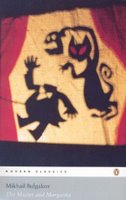
A museum dedicated to famous Russian author, Mikhail Bulgakov
has been largely destroyed by a religious fantantic, reports the
Australian. Alexander Morozov, a bitter critic of Bulgakov's work and a tenant in the same building which houses the museum, locked himself in and began chucking :
... many objects out of the window, including valuable illustrations of Bulgakov's works signed by great Russian artists, not to mention several computers. About half the contents were damaged.
The Russian Orthodox church had denounced Bulgakov's novel
The Master and Margarita as a
'satanic gospel' and it was not published until 26 years after Bulgakov's death in 1940.
But the book is, in fact, a political satire, which comments on communist-era Moscow. According to the Marriam-Webster Encyclopedia the novel was:
... published as Master i Margarita in a censored form in the Soviet Union in 1966-67. The unexpurgated version was published by the Soviets in 1973. It is considered a 20th-century masterpiece. The novel is witty and ribald, and at the same time a penetrating philosophical work that wrestles with profound and eternal problems of good and evil. It juxtaposes two planes of action--one set in Moscow in the 1930s and the other in Jerusalem at the time of Christ. The three central characters of the contemporary plot are the Devil, disguised as one Professor Woland; the "Master," a repressed novelist; and Margarita, who, though married to a bureaucrat, loves the Master. The Master has burned his manuscript and gone willingly into a psychiatric ward when critics attacked his work--a portrayal of the story of Jesus. Margarita sells her soul to the Devil in order to obtain the Master's release from the psychiatric ward. A parallel plot presents the action of the Master's destroyed novel, the condemnation of Yeshua (Jesus) in Jerusalem.
The
Australian reports that Morozov had been campaigning for years against the presence of the museum, which looks out to a park where the writer lived and where he placed the action of
The Master and Margarita. In 2004 Morozov organised a successful protest by residents against the construction of a monument to the writer.
This is a book I bought to read on
Raman's recommendation, especially after enjoying Bulgakov's zany
The Heart of a Dog but haven't got round to reading yet. (And Animah is currently reading it, anyway.) But now my interest is piqued ...



